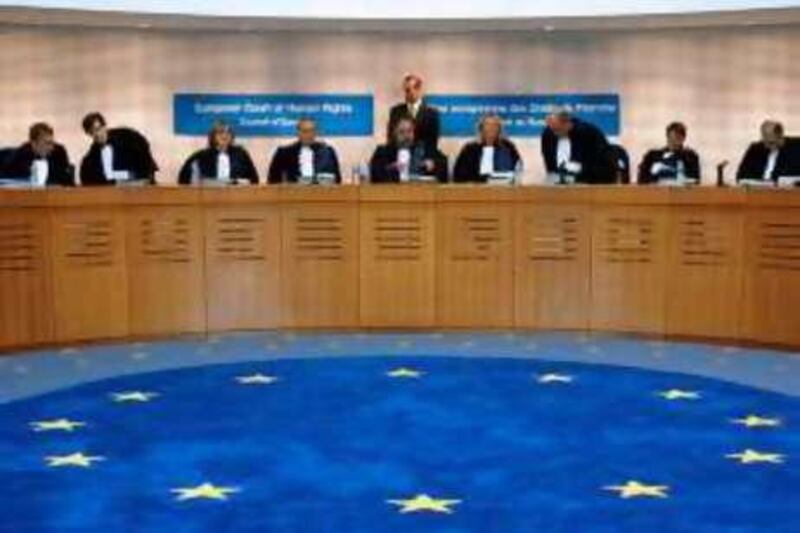MOSCOW // The last time Khapta Musayeva claims she saw her son, he was kneeling on tram rails near her home in Grozny, the capital of the Russian republic of Chechnya, the site of two bloody wars in the past 15 years. Mrs Musayeva's son, Yakub Iznaurov, had his hands tied behind his back by armed men in uniform who then took him away in a military vehicle, ostensibly for questioning, according to testimony she presented to the European Court of Human Rights in Strasbourg, Europe's top human rights court.
Iznaurov was 34 years old with a wife and five children when he was led away on Feb 5 2000, and his mother has not seen or heard from him since, despite numerous appeals to Russian authorities to investigate her son's disappearance. Mrs Musayeva is one of tens of thousands of Russians who, after failing to obtain what they see as justice in Russian courts, have taken their cases to Strasbourg. And last week the court ruled that the Russian government is liable for the presumed death of Iznaurov and ordered Russia to pay ?53,000 (Dh305,570) in damages to Mrs Musayeva - a sum Russia is required to pay as a signatory to the European Convention on Human Rights.
The ruling was the latest in a string of judgments in the court against Russia, which has more than twice as many cases pending against it in the court than any other country. As of June 1, there were 22,400 cases pending before the tribunal brought by Russian citizens who claim the government violated their rights - or a little more than 25 per cent of all cases currently pending at the court. The runner-up is Turkey, with a little more than 11 per cent of all pending cases, according to the court's website.
The enormous caseload highlights Russians' deep mistrust of their law enforcement authorities and judicial system, antipathy consistently reflected in opinion polls. Seventy-three per cent of Russians surveyed by the Levada Centre, an independent pollster, said they do not feel protected from abuses by police, tax officials, judges and other state institutions, as opposed to 22 per cent who said they do feel protected.
In the same poll, 62 per cent said they did not believe they could defend their violated interests and rights in Russia, as opposed to 25 per cent who felt they could. The June 20-23 poll surveyed 1,600 respondents across Russia and had a margin-of-error of three per cent. The Russian government has been loath to comment on rulings issued by the Strasbourg court, though the rising number of lost cases is not escaping the attention of top Russian officials.
Yury Chaika, the Russian prosecutor general, blamed subpar investigations, telling a meeting of senior prosecutors in May that poor work by prosecutors is producing a steep rise in the number of cases filed by citizens against the state in domestic courts and the European Court of Human Rights. The Strasbourg court this year has ordered Russia to pay ?4.3 million in damages to Russian citizens, Mr Chaika told the May 27 meeting, the Interfax news agency reported.
Dmitry Medvedev, Russia's president, told the Russian human rights ombudsman last month that the number of complaints filed by Russians at the Strasbourg court is "alarming" but attributed the trend to Russia's "liberal system" of appeals. "In many countries, one must go through a huge number of appeals before getting to the European court," the RIA-Novosti news agency reported Mr Medvedev as having said. Tatyana Kasatkina, executive director of the human rights group Memorial, said Mr Medvedev's assessment is off base. "People go to the European Court of Human Rights because of one reason: hopelessness," said Ms Kasatkina, whose group has provided legal assistance at the Strasbourg court for dozens of plaintiffs from war-scarred Chechnya, including Mrs Musayeva.
Many of the cases currently being heard in the court are disappearances in predominantly Muslim Chechnya dating back to 2000 and 2001 - at the height of the second war between Chechen separatists and Russian federal troops - a fact due largely to the huge backlog in cases, Ms Kasatkina said. Exacerbating the backlog has been the refusal of Russia's lower house of parliament to approve the so-called Protocol 14 of the convention on human rights, aimed at speeding up processing of cases.
"People wait four, five, six years for decisions at the European court," Ms Kasatkina said. "No one thinks the European court is going to solve all of their problems. But hopefully it will force our national courts to work better." Mr Medvedev, who has stressed the importance of judicial reform in Russia and tackling what he calls "legal nihilism" in the country, dismissed Veronika Milinchuk, Russia's envoy to the Strasbourg court, last week.
A spokesman for the Russian justice ministry said on Wednesday that Viktor Yevtukhov, a municipal parliamentarian in St Petersburg and a member of the pro-Kremlin party United Russia, had been nominated for the post. The Kremlin gave no explanation for Ms Milinchuk's dismissal, though it came on the same day that the Strasbourg ruled Russia was liable for the presumed death of Iznaurov in 2000. @Email:cschreck@thenational.ae






